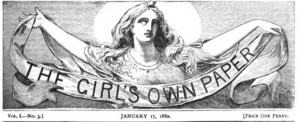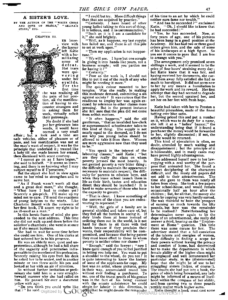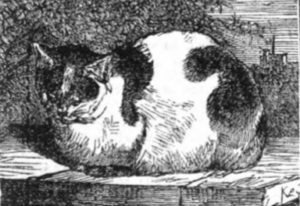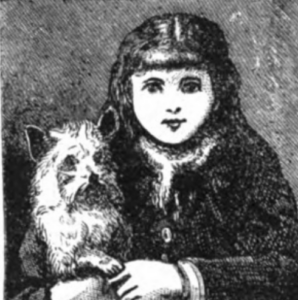
VARIETIES.
THE MAN OF YOUR CHOICE – That young girls should look forward to love and marriage seems to us both natural and honorable, for a woman’s crowning glory must always be wifehood and motherhood; but better than a marriage without love or love without esteem, is the “single life.” Women must not be taught that in wedlock lies their only or chiefest source of happiness; nor should they be allowed to suppose that it is all light and no darkness, all roses and no thorns. The truth is, that a maiden in marrying sacrifices much; she gives up her independence; to a great extent, her preferences; she consents to great changes in her pursuits, her habits, and, frequently, her friendships; she abandons almost all her past. She may well question her betrothed, in the words of Mrs. Browning –
“If I leave all for thee, wilt thou exchange,
And be all to me? Shall I never miss
Home-talk and blessing, and the common bliss
That comes to each in turn, nor count it strange,
When I look up, to drop on a new range of walls and floors, another home than this?”
For seldom we fear does the bride, half-smiling, half-weeping beneath her crown of orange blossoms, appreciate the character of the sacrifice she has made. Too often does she wake up with a sudden surprise to the awful breadth and depth of the chasm that lies between her wifehood and her maidenhood, the now and the then. She misses the mother, the sister, the tender felicities of home, the cherished places, the favorite pursuits, the old singleness of heart, the old serenity of mind, the delightful yet sober freedom of her blissful girlish days. She looks around, and unless she loves – loves long and deeply and worthily – she sees a blank and a dreary voic, and her heart aches with a dumb, dull pain that is never wholly conquered. Unless, we say, unless she loves; and .unless her love has lighted upon a man wholly meriting it, and fully capable of compensating her for the losses she has sustained, of making her even richer than before. – II’. Davenport Adams.
____________________________________________________________________
A Sister’s Love
THE GIRL’S OWN PAPER.
BY THE AUTHOR OF “THE WHITE CROSS”
AND DOVE OF SELINA’S PEARLS
STORY ETC.
CHAPTER III
Her inter-view with the lawyer left Katie with a hu-miliating sense of defeat. Hot tears were qui-vering under her eyelids. For the first time she was realising all the pain of her posi-tion, all the mortifica-tion of having to en-counter strangers and in asking them for work, virtually solicit their patronage.
No doubt if she had put her grievance into words, it would have seemed a very small affair ; but a look and a tone are safe vehicles, either of pleasure or of pain, and her morification was not at the man’s want of respect, it was for the principle that underlaid it ; treated like a lady till she made know her errand, then dismissed with scant courtesy.
But the object she had in view again came to her mind to strengthen and to nerve her.
“As if Frank wasn’t worth all that and a great deal more,” she thought. “What have I had to endure yet? Scarcely a pin-prick. I’ll make up my mind not to care. I’ll send the exactions of young ladyism to the winds. Like Charlotte Bronte with the reviewers of her first book, I’ll assert my right to be as ill-used as a man.”
In this heroic frame of mindshe pro-ceeded to the next address. This time she did not walk up and down before the solicitor’s chambers; she went in at once as if she meant business.
She had to wait for some time before she could see him. One of his clerks at last ushered her in to his presence.
He was an elderly man, quiet and unpretentious, although he had a full share of the sagacity and penetration indis-pensable to the members of his profession. Scarcely raising his eyes from his desk he asked her to be seated, and in another minute or two threw aside his pen and looked at her with an air of attention.
So without further invitation or preli-minary she told him in a very straight-forward manner why she had called on him. He passed her over a document yellow with age.
“Do you think you could write like that?” he said.
“I could but try. More difficult things that that are acquired by practice.”
“Such as it is I am a candidate for it,” she aid brightly.
“Well, as it happens, my last copyist has failed me, and there is all this pile to set at work upon.”
“Then my application is not inoppor-tune.”
“We will see. I have but onescruple in giving it into hands like yours, not a business scruple; will you pardon me for having it?”
“Certainly.”
The quick colour mounted to her temples. Was she really, in making this moderate demand, committing a sin against society? It was curious that the readiness to employ her was again ex-cused by reference to other claims made more pressing. But in the present instance she felt sure that the plea did not come from selfish motives.
“You speak in the interest of the labouring classes,” said Katie ; “but are they really the class on whom poverty presses the heavily. Is not genteel poverty a very bitter thing ; the difficulty to maintain the appearance necessary to maintain respect ; the difficulty for parents to educate their boys, and when they leave school launch them in life as their birth, tastes and education direct they should be launched? It is hard to make servants of those who have the capacity to govern.”
“That is clear. I know something of the sorrows of the class you are endea-vouring to represent.”
“Enough,” said the lawyer ; “now I know quite enough of you to feel justified in letting you help me. You want to put a shoulder to the wheel, do you not? It is quite interesting to know the history of some of the applicants for copy. My last was an artist, whose pictures, gems in their way, accumulated round him without ever finding a purchaser. To me, one of the truest proofs of his genius was in the fact of his being content with the scanty subsistence he could obtain for labour in this direction, in order that he might devote the remainder of his time to an art by which he could neither earn fame nor wealth.”
“And has he succeeded?” exclaimed Katie. “Oh I should like to know that he had succeeded!”
“Yes, he has succeeded. Now, at forty years of age, one of his pictures has been hung in a good position at the Academy. He has had two or three good orders given him, and the sale of some of his landscapes at a high figure. So you see it comes to pass that I am free to arrange with you.”
The arrangement only promised seven shillings a week, and it seemed to be the price of four hours’ straining every day; but Katie knew that it was fair, and having received her documents, she car-ried them away fully satisfied she had so much to her object. It did not seem now to her by any means a humiliation to apply for work and its reward. Her first attempt that day had seemed to degrade her, but the second upraised her, and set her on her feet with fresh hope.
Katie had taken with her to Preston a beautiful pincushion, made of the finest tatting over blue satin.
Having priced this and put a number on it, which was to do duty for a name, she left it at a “ladies’ bazaar,” the understanding being that if it found a purchaser the money would be forwarded to her, slightly discounted; if not, the article would be returned.
This kind of speculation is often, no doubt, attended by much waiting and disappointment ; but the principle of it is honorable, and in many cases may have proved highly advantageous.
She addressed herself now to her law-copying with a zeal worthy of the pur-pose that animated her. She found a correct deciphering of the characters difficult, and the musty old papers did not add to their attractiveness. The time she gave to them was nearly all taken from sleep. She took a few papers to her school-house, and would remain occasionally half an hour after the children ; but, for all that, the money she made by copying was very hardly earned. She was thankful to have the prospect of earning so much towards the fifty pounds, but how was the remainder to be realised? Notwithstanding her determination never again to be the dupe of an advertisement, she really did answer a third, bearing on the “Employment at Home” question. This time there was some excuse for her. The advertiser stated that a full conviction of the talents and energies of women, their difficulty in finding a scope for their powers without leaving the privacy and comfort of the home, had determined her to make the departments in which female ability of the higher class might be employed and well remunerated her particular study, in the (disinterested) hope that she might be of use to her struggling sisters (ladies, of course!). The results she had put into a book, the price of which being forwarded, any lady might be informed of a means to a liveli-hood within the compass of her ability, and from earning two to three pounds weekly realise much higher sums.
Katie thought a book must cast some light on the difficulty, and speculated thereupon witht the inevitable postage stamps. And if she was disappointed in finding her “forte” it was a pity, for no sphere for the exercise of genius and industry was omitted, from the writing of novels and illustrating of the same to the extraction of corns. Nay, this last profession seemed to be the most promising and lucrative of all, for the author stated flourishing ly that she knew of one fair shiropodist who always waited on her patients in her carriage. Katie was not ambitious of that distinction; more-over, remaining “at home,” her practice was likely to be limited. The trades held sacred to the lords of the creation were encroached upon most mercilessly. Chemistry was declared to be per se a feminine vocation, because an intel-lectual one; and as an encouragement to the chemical aspirant, the author thought that possibly Mr. Thomas Smith of Cheapside, might take a pupil. (N.B. masc., apprentice, fem., pupil.) “Unfortunate Mr. Smith!” exclaimed Katie. “I wonder if he will have a hundred girls writing to him ; and if he takes one, unfortunate ninety and nine!” She turned over to be informed how to japan tea-trays, make sweetmeats, and bead fringes ; but though the book might contain a stray hint for a person living in a large town, desirous of in-creasing her income in a private way, there was nothing that could possibly be a guide to her.
She felt so flat and then so angry after the perusal of this highly satisfac-tory pamphlet that she thought she should never again hear the assertion, “Where’s there’s a will there’s a way” without being in a fever to contradict it.
But how often in such cases does the way open when we are least expecting that it will be so accommodating.

*Note on the “H”: This is referred to as an “illuminated H,” and follows the tradition of medieval manuscripts. This type of illustration is eye-catching, thereby enticing the reader to read the story that follows.
________________________________________________________________
The immense steppes comprised between the Caucasus, the Sea of Azof, and the Caspian Sea, abound with horses both tame and wild. They form small troops of from 20 to 25, at the head of which one horse seems to hold undisputed sway. Mares and foals compose the rest of the number. When the foals increase in size, their chief will no longer allow them to remain amongst them, but chases them away from their usual haunts. It often occurs that a young, weakly foal, expelled by the despot, continues following its late companions at a safe distance, observing them with an eye of regret here, and receiving visits from its mother, who furtively nourishes it.
FRENCH CATS

That cats in France possess more intelligence than dogs is the firm conviction of a friend of mine. She had a cat who daily sat on a window-ledge, whence she could perceive persons coming across the garden to pay visits to inmates of the house. Directly she saw an acquaintance of her mistress, she jumped down, scratched at the door to have it opened, received the visitor with suitable respect at the bottom of the staircase, and went up with her to introduce her into the drawing-room. When the visitor got up to take leave, Pussy accompanied her as far as the garden-gate, and then resumed her place on the window-ledge to awat other visitors.
POMPEY

I went down to Styria with mamma to pass the autumn with a friend at her lovely baronial mansion. Our dog was certainly to accompany us; indeed, how could we leave him behind? – rather would we have renounced our visit. Poor Pompey, enjoying the scene and the change as much as we did, bounded with exuberance of spirits till he made and havoc with the baroness’s pretty drawing-room furniture.
“Your dog is really too free,” said her son, a boy of about twelve years of age. “Everything will be spoilt.” The remark was made in perfect good humour but we felt distressed and annoyed. “We will tie him up; we see that he is wild with delight, the scent of the pine forests seems really to intoxicate him.” They would not allow him to be tied up, but the Styrian youth undertook to keep Pompey in order, and once or twice administered to him a rather smart caning, which, for our sake, he seemed courageously to endure. Upon the next occasion, looking about for his stick to give him a slight tap, he was astonished not to find it – it was nowhere to be seen. Pompey was standing on the door mat at the top of the garden steps, as if enjoying the scene; he had secretly snapped the cane in three pieces, and had hidden them under the mat on which he stood!
A DOG THAT CALCULATED TIME.
Moss was a grand collie, and did his duty by the sheep in an unexceptionable manner.
But what made us all like him was the devoted affection he showed for a little boy, the only child of his master and mistress.
Wherever Tom went, if otherwise unguarded, Moss accompanied him, his wistful looks turned towards the child, and woe betide the person who offered to touch the boy in an unkindly fashion. When Tom was old enough to go to school he used to start for town on Monday morning early, and did not return to the farm until Saturday afternoon; the distance being too great for him to walk to and fro daily.
On Saturday there was a meeting. Tom was not a demonstrative lad, and was not perpetually fussing about Moss; but they understood each other perfectly.
Twice the boy and dog parted and met in this fashion, but on the third Satuday afternoon, Moss stationed himself on a little rising ground, from which he could see the road his young master must traverse.
At the first glimpse of Tom in the far distance, he bounded to meet him, and the pair trudged homewards together.
From that time Moss went every Saturday to meet Tom, never making a mistake, or starting on the wrong day, or at the wrong time. On other afternoons, he enjoyed his after-dinner snooze by the kitchen fire, or under the shelter of a hayrick, and only left it at the shepherd’s call.
But one Saturday came – after years of unerring calculations on the old dog’s part – and Tom looked in vain for his shaggy friend. When he reached home Moss was stretched on the hearth-rug, and Tom, after his gentle fashion, was beginning to ask why he had not come as usual, to cheer him on his way.
Poor Moss! He heard the beloved voice, but his glazing eyes could not see his young master; yet, guided by the sound, he dragged his failing limbs to the lad’s feet, and there he dropped and died. I do not think my little friend Tom did anything unworthy of a brave boy when he let his tears fall, thick and fast, on the shaggy head of his old, dead doggie. And when he heard that the poor beast had started to meet him, but had dropped from sheer weakness – he had been suffering for days – it is not surprising that all the farmhouse dainties offered in succession could not tempt Tom to taste a morsel that night.
Some helpful links:
Read more about the Girl’s Own Paper here.